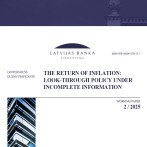On anticipation, rush and the "great migration of peoples"

With anticipation by economic agents being followed by a rush, as well as weighing the implementation of postponed ambitions and the delay of current plans, it is appropriate to conclude that economic growth was absent in the second quarter. According to the flash estimate of the Central Statistical Bureau (CSB), in the second quarter the gross domestic product (GDP) was 1.4% lower than in the first quarter when the economy vigorously broke free of the embrace of pandemic restrictions. However, similar to the widely known average temperature in the hospital, the seemingly negative change encompasses diverse developments in this case as well.
While more detailed data on the GDP are expected in late August, it is estimated that the fastest growth during the second quarter was experienced by several services sectors. It was accomplished either by travelling, accommodating and catering, by organising or by enjoying cultural, recreational, entertainment and sports events involving far more people than it has been possible since the onset of the pandemic. The same was also true of air traffic services. These are also the areas where consumers might already balance, on the one hand, a desire to implement the ambitions postponed during the pandemic and, on the other hand, cautious spending in anticipation of the new heating season. Although card payment data for the second quarter showed an increase in nominal terms, some plans in real terms could now be nothing but a shadow due to the elevated inflation.
A temporary activity in the real estate sector might be generated by the "great migration of peoples" – a figurative designation for the attempts by households and businesses to find a solution to easing the cost burden (possibly until the start of the new heating season) by choosing more compact and energy-efficient living quarters or business premises. The housing needs of the Russia-Ukraine war refugees also contribute to the activity of a specific real estate market niche. The data of Colliers International show an upward trend in the share of vacant premises in the A and B1 category office space rental market in Riga, as well as a persistently high share of unused premises in shopping centres during the second quarter; this might suggest both the above "migration" and the suspension of company plans in the near future.
Retail trade possibly fired most shots during the first quarter of this year when Covid-19 restrictions were eased and consumers were quick to meet their pent-up consumption in individual commodity groups. In the second quarter, manufacturing was partially bolstered by previously stocked materials, yet their lack was already increasingly seen as a development-hindering factor in the confidence surveys conducted in the second quarter (although in Latvia this factor is mentioned as an impediment less often than in EU countries on average). Short-term data on the energy sector development suggest that resource austerity arrangements, most likely, have already been activated in the sector, for instance, electricity generation through cogeneration has dropped and is close to the historical low in the respective season.
A simultaneous rush and anticipation remain the background to the growth during the third quarter. Energy costs and a desire for a more autonomous and secure power supply is a cause of rush to find solutions; nevertheless, an increasing demand for solutions prolongs the waiting time for the implementation. During the third quarter, the rush and anticipation also accompany those longing for travel at the airports where the supply of services often does not match the demand. The demand for services that has grown along with the upsurge in energy prices has already substantially raised the price level of accommodation, catering, recreational and entertainment events both in Latvia and in the EU overall. Despite the government support measures, the curbs on growth caused by the costs will accompany the Latvian economic growth during the second half of the year.
Textual error
«… …»






